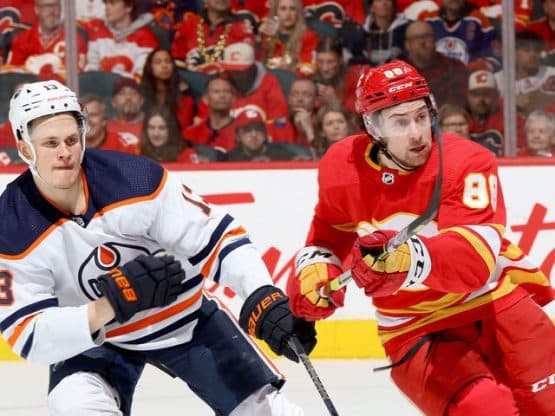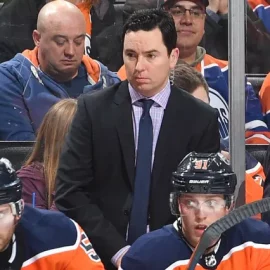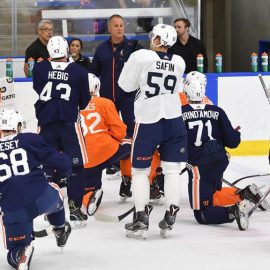On Monday, the NHL made a major announcement surrounding the 2018 Olympic Games. The announcement, while not a surprise, was still disappointing to fans of the sports. The NHL essentially shut the door on players going to the games in South Korea, saying they now “consider the matter officially closed.”
As a fan of the sport of hockey, I am disappointed by this news. I deeply enjoy watching the best-on-best Olympic tournament, and think it is some of the best hockey the sport has to offer. I’m also deeply upset that, as an American fan, I’ll be missing what appears to be the best crop of young American players ever.
Canadian fans can feel my pain of not seeing Jack Eichel, Auston Matthews and others when they realize that Connor McDavid likely will never play with Sidney Crosby on the Olympic stage. There is no doubt in my mind that hockey fans have been robbed of something. At least, on the surface they have.
That all being said, I believe that the NHL actually made the right call when it comes to Olympic participation. While fans lose out on a great tournament (fans losing is a theme in sports now sadly), the league made the best business decision it could have. I also believe the possibility of a best-on-best replacement tournament is higher than we think.
It’s Simple Business:
The NHL doesn’t make money off the Olympic games. While the IOC paid for players’ insurance and travel costs for Sochi in 2014 ($14 million according to Sportsnet), the group was not willing to do the same for the upcoming games. That would have meant the money would have had to come from elsewhere.
The IIHF offered to pay the bill, but why should they have to forfeit that kind of money, money that could be spent on hockey development around the world? The NHL also could have paid those costs, but why the hell should NHL owners shell out that kind of cash for a tournament that generates them absolutely no money and risks injury to their biggest stars?
Sure, everyone is pissed off the we won’t see loaded rosters in South Korea, but if you put your emotions aside for a second, you’ll realize this was a no brainer. The NHL would have had to shutdown for around 17 days in February. That is prime time for hockey in the States, in fact it is when many people truly begin to pay attention.
While the NHL is no match for the NBA in a head-to-head battle, the NHL thrives during the months of February and March because the NFL season is over and MLB season has yet to begin. Think this is an exaggeration? Boston sports radio won’t truly talk Bruins until Patriots season is over. The Bruins usually gain the spotlight in January or February and they hold it until Fenway opens its doors most years.
If you shutdown during this stretch, you are closing your business at its most profitable time so that your assets can go and make someone else money. Without proper compensation, it literally makes no sense for NHL owners to send their players to the Olympics.
If the league was somehow making some sort of money off participation, then fine. The simple fact is they aren’t. The NBA doesn’t shutdown to go to the Olympics, MLB teams don’t lose guys mid-season for the WBC. Why should the NHL stop for the Olympics?

Injuries:
Like it or not, injuries happen at the Olympics and they have a major impact on the Stanley Cup race. For example, the New York Islanders lost John Tavares to injury during the Sochi games in 2014. After taking a giant step and making the 2013 playoffs, New York crumbled without Tavares and missed the playoffs.
Detroit lost Henrik Zetterberg to injury in those same Olympics. Zetterberg missed significant time after that and was a non-factor in Detroit’s first round loss to Boston. Aleksander Barkov, Fedor Tyutin, Mats Zuccarello and Paul Martin all suffered injuries in Sochi that kept them out for an extended period upon return.
In 2006, you could argue that the Ottawa Senators franchise was altered when Dominik Hasek hurt his groin. The star netminder missed the remainder of the regular season and then the playoffs, where Ottawa would fall in the second round to Buffalo. He would never play for them again.
Imagine Connor McDavid goes to South Korea, gets hurt and derails the Oilers’ season? Sure, it’s a drastic example, but it’s happened many times before and will happen again. Once again, it’s simply not worth the risk for the NHL.
The NHL Does NOT Need The Olympics:
There seems to be a misconception that the Olympics makes the hockey tournament great. That, quite frankly, is false. What makes the Olympics great is the fact that it is a best-on-best tournament. Prior to 1998, NHL players didn’t go to the Olympics and international hockey did not suffer.
While the Olympic hockey has been great, there are alternatives to it, including the World Cup of Hockey. With a few tweaks, I firmly believe that the World Cup could be a viable replacement to the Olympic games.
Obviously gimmicks like “Team Europe” and “Team North America” would have to go, and the best eight countries would take part in the event. This would make it a true best-on-best event. That, in theory, would replace the Olympics in terms of participants.
I’ve seen some ideas like naming a host country and playing games all over the country like FIFA does with their World Cup. I’ve seen some recommend seeding eight teams like an NHL playoff bracket and playing best-of-three or five game series throughout the tournament. Both of those are really cool ideas that could improve the product we saw this past September.
While there are some items that would need to be ironed out, the NHL has the ability to make a best-on-best tournament and profit from it, it would be the best of both worlds. The league would be happy, players would be happy and fans would eventually be happy (maybe).
The NHL made the right decision by deciding against Olympic participation. Now let’s see what they do next to replace the event.
Add The Sports Daily to your Google News Feed!









